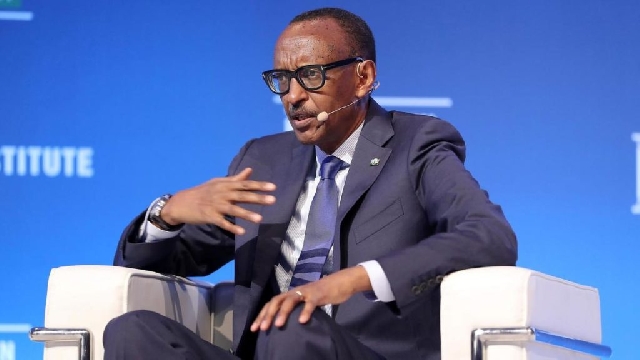 Paul Kagame, born 23 October 1957, is President of the Republic of Rwanda. He is now a constitutional political leader but had a stint as military leader earlier in his life. He took presidential office in 2000 after the resignation of his predecessor, Pasteur Bizimungu.
Paul Kagame, born 23 October 1957, is President of the Republic of Rwanda. He is now a constitutional political leader but had a stint as military leader earlier in his life. He took presidential office in 2000 after the resignation of his predecessor, Pasteur Bizimungu.
He is known to have commanded the rebel force that ended the 1994 Rwandan genocide and served as a de facto Vice President and Minister of Defence from 1994 to 2000.
President Kagame has gained widespread recognition and applause for his national development agenda, launching ‘Vision 2020’ to develop Rwanda into a middle-income country.
His ‘Vision 2020’ agenda which includes health care and education occasioned a commendable annual growth between 2004 and 2010 averaging 8% per annum. He won an election in 2003 under a new constitution adopted that year and was elected for a second seven-year term in 2010.
Rwandans re-elected him in August 2017 under another change in the constitution. Many have cited that the constitutional amendment could potentially make him President until 2034.
However, Kagame has been described as one of the most impressive African leaders credited with changing the face of Rwanda within a short time through an aggressive developmental plan and determination.
On the matter of his leadership, there are two schools of thought. One school posits that he is an autocratic leader manipulating the constitution to stay in power for long while the other school rationalizes his actions stating that it is not the mere nominal adoption and practice of democracy, where a leader serves a maximum of terms and leaves the country underdeveloped and saddled with corruption and economic instability that is good for Rwanda but one which is committed to developing the country as Paul Kagame has exhibited.
His followers also cite his tenure as African Union Chairperson and assert that his commitment has reflected during his tenure in 2018. Within the one-year term, he earned a reputation as a reformist who inter alia promoted free trade in Africa.
In sum, the legacy of President Kagame’s administration can be found in the areas of education, accessible and quality healthcare, peace and reconciliation, women’s empowerment, promotion of investment and entrepreneurship, development and access to information technology.
“… No One Is Going To Transform Africa On Our Behalf. It Is Up To Us. However, The Pace And Quality Of Integration In Africa Is Increasing Noticeably, And This Is Very Significant”
He has indeed walked his talk as his convictions on Africa’s future are crystallized in these words “no one is going to transform Africa on our behalf. It is up to us’.
Source: African Post Online























